|

Nursing Faculty Member Offers
Guidance in Kabul
by Susan Katsaros
From Dateline (March 27, 2003)
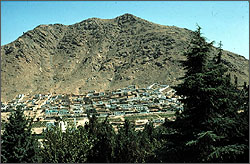 |
| Kabul hillside with local housing |
It had been more than 20 years but the desire
to return to Afghanistan was a strong one for Paula L. Herberg,
who recently returned to campus after an intensive three-month infrastructure-building
visit to the war-torn country.
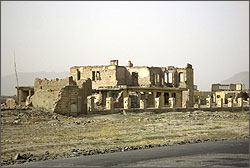
Parts of Kabul have been destroyed by
years of conflict– most of this destruction was during
the
fight against the Taliban by northern forces.
|
“My memories of Kabul are
bittersweet - I returned to a much different Kabul than the
one I knew in the 1970s - places were no longer in existence,
and buildings had fallen into disrepair, but many of the students
are now the health educators and leaders. A former patient,
and even a shopkeeper, still recognized me,” said Herberg,
associate professor of nursing. She also found that she had
to quickly get |
back up to speed on her Urdu and Dari (a Farsi
dialect) language skills, which were only conversational.
Herberg's latest international venture was the result of an invitation
by Aga Khan University in Karachi, Pakistan, to work on a collaborative
effort by the university, the World Health Organization and the
government of Afghanistan. The three entities are charged with strengthening
the nursing/allied health education system in Afghanistan.
Herberg lived
and worked in Kabul for three years during the 1970s when
she was with CARE Inc. as a nurse educator. From 1988 to 1998,
Herberg taught at Aga Khan University, serving as associate
dean of nursing for three years, as well as director of the
School of Nursing for seven years. Herberg helped develop
the university's nursing curriculum, implement the first baccalaureate
nursing
|
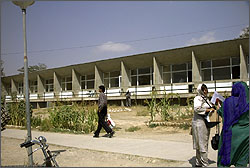 The Intermediate Medical Education Institute
in Kabul educates nursing, midwifery and allied health students.
The Intermediate Medical Education Institute
in Kabul educates nursing, midwifery and allied health students.
|
program in the country and worked at the local
hospital.
Surprisingly, Herberg learned that nursing education
for women continued even under the Taliban rule – “It
was just kept quiet,” she said. Most of the faculty members
in Kabul remained, but Herberg found that it was as if time had stopped.
Programs had not been updated, curriculum content was not revised.
“The faculty members are existing in a time
warp in terms of their understanding of modern healthcare delivery,”
the educator said.
| Herberg's objective was to assess
the present situation, focusing on Kabul's Central Intermediate
Medical Education Institute, which serves as the central facility
for nursing and allied health education in the country. She
visited local hospitals and met with health officials in the
Ministry of Health, as well as local donor/aid agencies in the
field, such as UNICEF. Herberg developed a five-year plan of
goals, strategies, activities, resources and budgeting. |
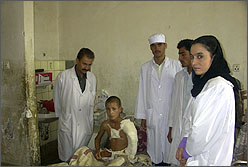 Wazir Akhbar Khan Hospital in Kabul.
The young patient, injured in a mine explosion, is cared for
by
Wazir Akhbar Khan Hospital in Kabul.
The young patient, injured in a mine explosion, is cared for
by
the Director of Nursing, left, the clinical instructor
from IMEI, front right, a nursing student, second
from right, and a dressing technician.
|
She also agreed to return to Kabul this summer to
evaluate the project's status, although her return is dependent
on security issues and the status of the military situation in Iraq.
If she is able to go, Herberg hopes to see that steps have been
taken to implement the plan for curriculum improvements, course
content and faculty development.
“I would like to see a good infrastructure in
place for the university team working in Kabul, and that relationships
between the university team and other stakeholders, such as the
Ministry of Health, IMEA administration and UNICEF, have been well
established and maintained.
“Personally, I would like to be able to spend
more time with some of the nurses and hear their stories - especially
through the Taliban times - in order to get a clearer picture of
how they survived and how nursing fared during that time,”
she said. “I hope to see that the level of returning to normalcy
in Kabul has been maintained and that there has not been an escalation
of violence or worsening of economic conditions.”
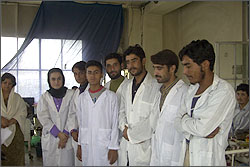
Nursing students
|
Herberg is a nurse with 15 years
of experience in international work. “I've lived and
worked in Afghanistan, Pakistan, Nepal and Thailand - at a
Cambodian refugee camp. I've been in east Africa, in Kenya,
Uganda and Tanzania/Zanzibar. I also visited Tajikistan as
a nurse consultant.”
|
After 10 years in Pakistan, the Southern California
native felt it was time to come home and re-establish her roots. She
continues work overseas on a consulting basis, such as a visit to
Tajikistan in 1998 and a four-month trip to East Africa in 1999. She
joined the Cal State Fullerton faculty in 2000.
«back to people |